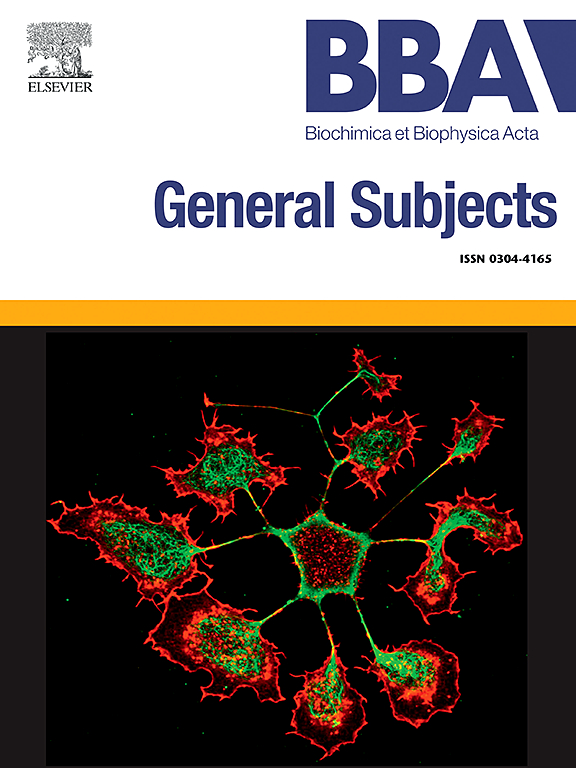通过 PPARγ 激活和 JNK/SIRT1 信号传导,可减少前脂肪细胞中 MCP-1 的产生。
IF 2.2
3区 生物学
Q3 BIOCHEMISTRY & MOLECULAR BIOLOGY
Biochimica et biophysica acta. General subjects
Pub Date : 2025-02-01
DOI:10.1016/j.bbagen.2024.130737
引用次数: 0
摘要
肥胖诱导的单核细胞化学引诱蛋白1 (MCP-1)的产生导致单核细胞/巨噬细胞浸润到白色脂肪组织(WAT),这有助于全身性胰岛素抵抗。已知过氧化物酶体增殖物激活受体γ (PPARγ)激动剂可减少人类和小鼠MCP-1的产生;然而,WAT的潜在机制尚不清楚。在这里,我们提出了一种减少前脂肪细胞中MCP-1产生的新机制。PPARγ激动剂罗格列酮(RSG)减少了3 T3-L1前脂肪细胞和小鼠间质血管部分来源的原发性前脂肪细胞对脂多糖(LPS)的反应中MCP-1的产生和分泌。RSG和SP600125(一种c-Jun n -末端激酶(JNK)抑制剂)均抑制lps诱导的沉默信息调节因子2同源物1 (SIRT1)的降解,SIRT1是3 T3-L1前脂肪细胞中MCP-1产生的负调节因子。此外,RSG抑制lps诱导的核因子-κB活化。RSG的这些作用在3 T3-L1前脂肪细胞转染Pparg siRNA后被消除。这些发现强调了PPARγ激活抑制前脂肪细胞中JNK/SIRT1信号传导并有助于减少MCP-1产生的新机制,表明前脂肪细胞可能是治疗胰岛素抵抗的潜在治疗靶点。本文章由计算机程序翻译,如有差异,请以英文原文为准。
Reduction in MCP-1 production in preadipocytes is mediated by PPARγ activation and JNK/SIRT1 signaling
Obesity-induced monocyte chemoattractant protein 1 (MCP-1) production leads to the infiltration of monocytes/macrophages into white adipose tissue (WAT), which contributes to systemic insulin resistance. Peroxisome proliferator-activated receptor gamma (PPARγ) agonists are known to reduce MCP-1 production in both humans and mice; however, the underlying mechanism in WAT remains unclear. Here, we propose a novel mechanism for the reduction in MCP-1 production in preadipocytes. The PPARγ agonist rosiglitazone (RSG) reduced MCP-1 production and secretion in response to lipopolysaccharide (LPS) in 3T3-L1 preadipocytes and mouse stromal vascular fraction–derived primary preadipocytes. Both RSG and SP600125 (a c-Jun N-terminal kinase (JNK) inhibitor) inhibited LPS-induced degradation of silent information regulator 2 homolog 1 (SIRT1), a negative regulator of MCP-1 production in 3T3-L1 preadipocytes. Furthermore, RSG inhibited LPS-induced activation of nuclear factor-κB. These effects of RSG were abolished in 3T3-L1 preadipocytes transfected with Pparg siRNA. These findings highlight a novel mechanism by which PPARγ activation inhibits JNK/SIRT1 signaling in preadipocytes and contributes to the reduction in MCP-1 production, suggesting that preadipocytes could be a potential therapeutic target for the treatment of insulin resistance.
求助全文
通过发布文献求助,成功后即可免费获取论文全文。
去求助
来源期刊

Biochimica et biophysica acta. General subjects
生物-生化与分子生物学
CiteScore
6.40
自引率
0.00%
发文量
139
审稿时长
30 days
期刊介绍:
BBA General Subjects accepts for submission either original, hypothesis-driven studies or reviews covering subjects in biochemistry and biophysics that are considered to have general interest for a wide audience. Manuscripts with interdisciplinary approaches are especially encouraged.
 求助内容:
求助内容: 应助结果提醒方式:
应助结果提醒方式:


